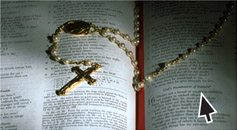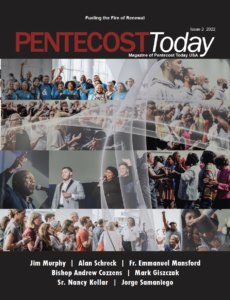The Epiphany of the Lord
Meditation and Questions for Reflection or Group Discussion
(Isaiah 60:1-6; Psalm 72:1-2,7-8,10-13; Ephesians 3:2-3,5-6; Matthew 2:1-12)
The Epiphany, A Time to Offer Our Gifts to the Lord
They opened their treasures and offered him gifts. (Matthew 2:11)
Without a doubt, the Magi were big spenders. The gifts they gave to Jesus were about the costliest items you could find in the ancient world. Not only that, they were exactly suited to their recipient: gold, a precious metal that was meant for royalty; frankincense, an oil used for worship; and myrrh, a perfume used in anointing the departed, pointing toward Jesus’ passion and death.
But what about us? Can we even pretend to match these extravagant offerings? Yes, we can! In fact, we can offer Jesus something much more valuable: ourselves! Imagine how valuable we are to the Lord. He became a man for us. He devoted his life to spreading the good news for us. He died on the cross for us. Jesus did everything for us because he sees us as the “pearl of great price” (Matthew 13:46).
Unfortunately, many of us have a hard time seeing how valuable we are. Instead of a shiny, gift-wrapped present, we see ourselves as a dull, brown-paper package of weakness and sin. That’s not how the Lord sees you! Yes, he sees the flaws and failings, but he sees so much more. He sees the love in our hearts, even if it’s somewhat buried by selfish thoughts. He sees the noble desires, even if we don’t always follow them. He sees the sacrifices we are making for our loved ones. He sees our longing for peace, even if we are sometimes agitated—or agitators. He sees us and tells us we are “very good” (Genesis 1:31).
So don’t discount the treasure you have in these earthen vessels. Go ahead and offer the Lord the gold of your talents and gifts, the frankincense of your prayer and worship, and the myrrh of your sufferings and heartaches. As you do, your heart will change. You will become a gift to your brothers and sisters, and you’ll change their lives!
“Lord, let this coming year be my gift to you. Take everything I have, and use it to build your kingdom!”
(Many thanks to The Word Among Us (www.wau.org) for allowing us to use meditations from their monthly devotional magazine. Used with permission. The Word Among Us Mass Edition contains all the Mass readings and prayers, and a meditation for each of the daily and Sunday Masses.)
Download this reflection with discussion questions here.
Sunday, January 4, 2014
Questions for Reflection or Group Discussion
- The first reading should fill us with hope as we contemplate what God has accomplished in the coming of Jesus. Through his coming: “the glory of the Lord shines upon you,” “your sons (and daughters) come from afar,” and “you shall be radiant at what you see, your heart shall throb and overflow” (Isaiah 60:1,4,5). In what ways does your faith in Jesus fill you with hope? What are some ways that you can increase your faith in him during 2015?
- The Responsorial Psalm speaks of a king endowed by God to “govern your people with justice,” “rescue the poor when he cries out,” “have pity for the lowly and the poor,” and “the lives of the poor he shall save” (Psalm 72: 2,12,13). In what ways has Jesus fulfilled these words? In the coming year, what are some new steps you can take to share in this work of Jesus?
- In the second reading, we hear the wonderful revelation that the Gentiles are now coheirs with the Jewish people in all the promises fulfilled in Jesus Christ. How can we as Catholics be a better witness of Christ’s love to our Jewish brothers and sisters? Why not spend a few minutes now to pray for Jewish people whom you know, and for all the Jewish people, that they may one day come to know Jesus as their Messiah.
- In the Gospel, we are told that when the magi inquired of the whereabouts of the “newborn king of the Jews,” King Herod was “greatly troubled and all Jerusalem with him” (Matthew 2: 2,3). Why do you think King Herod was so troubled by this news? The magi, on the other hand, were overjoyed when they found Jesus, and “did him homage” (2:11). Why do you think the magi’s reaction was so different than Herod’s? What is your reaction when you reflect on these events?
- The meditation, in speaking of the gifts of the magi, says that “we can offer Jesus something much more valuable: ourselves!” Why is this true? The meditation goes on to say that “Unfortunately, many of us have a hard time seeing how valuable we are.” What prevents you from seeing yourself as “the Lord sees you,” that is, a beloved child of God and the “pearl of great price”? Finally, the meditation exhorts us not to “discount the treasure you have in these earthen vessels.” What are the gifts the Lord has given you that you would like to offer back to him?
- Every day, God invites us to roll up our sleeves and get to work building his kingdom, using the gifts he has given us. What additional steps can you take individually, or with others, to help build the kingdom of God?
- Take some time now to pray that in 2015, you would receive the grace to use the gifts God has given you to build his kingdom. Use the prayer at the end of the meditation as the starting point.
[The discussion questions were created by Maurice Blumberg, a member of the NSC Council and a director of partner relations for The Word Among Us Partners, (http://www.waupartners.org/), a ministry of The Word Among Us (www.wau.org) to the Military, Prisoners, women with crisis pregnancies or who have had abortions, and college students. Maurice was also the founding Executive Director of the National Fellowship of Catholic Men (http://www.nfcmusa.org/), for which he is currently a Trustee. He can be contacted at mblumberg@wau.org or mblumberg@aol.com].


 Click Here for us to pray for your intentions through our new website.
Click Here for us to pray for your intentions through our new website. 
